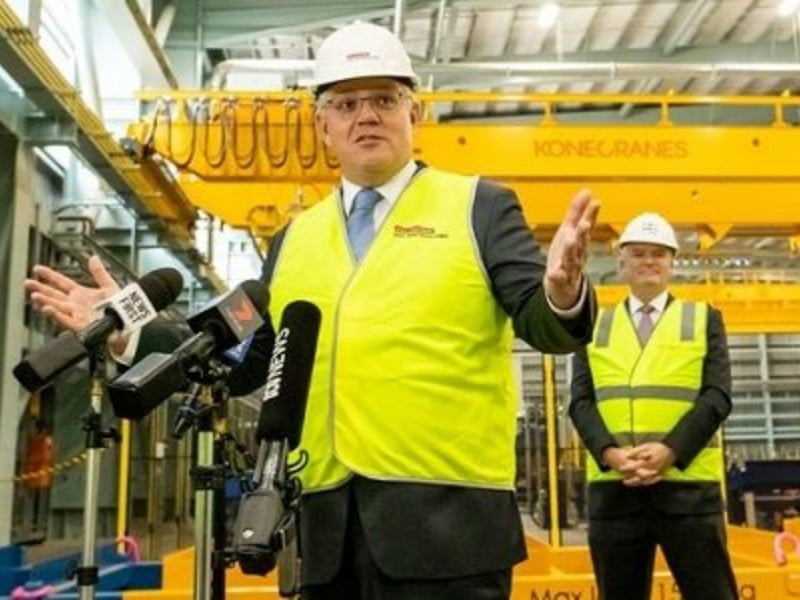More than $450 million in funding for Australia’s critical minerals industry has been unveiled by the federal government in an effort to reduce reliance on China, including $240 million in manufacturing grants and $50 million for a virtual R&D centre.
Prime Minister Scott Morrison on Wednesday announced two significant funding packages for the critical minerals sector.
The first involved four grants worth a total of $143 million under the collaboration stream of the $1.3 billion Modern Manufacturing Initiative, going to a range of critical minerals and rare earth processing projects.
The other announcement is $250 million in new funding that will be included in this month’s 2022-23 budget, for a new grants program and a research and development centre for critical minerals.

There has been increased focus on critical minerals in recent years, coupled with renewed efforts to improve Australia’s sovereign capability and reduce its reliance on China. China currently conducts up to 80 per cent of the world’s critical minerals production, and while Australia has large deposits of rare earth minerals, there is no domestic production capacity.
These resources are key ingredients for a range of technologies, including renewables, smartphones and electric vehicles.
“The world is becoming a more uncertain place and we want to secure Australia as a reliable partner for local and global businesses that need the critical minerals we have right here,” Mr Morrison said in a statement.
“We’ll dig them up right here. We’ll refine them right here. We’ll look to make the products that use them right here. As the global economy changes, there are exciting new growth opportunities emerging in areas such as rare earths and critical minerals that ultimately mean we can deliver a stronger economy for Australia and secure a stronger future.
“Critical minerals are used in more and more essential products. That means there are huge opportunities to back the Australian critical minerals with programs like these, to be a partner whose products are high quality and consistent. A partner people can trust to deliver.”
Half of the manufacturing grants funding will go towards Pure Battery Technologies’ $399 million Western Australian pCAM Hub. The federal government will contribute $119.6 million towards the integrated nickel manganese cobalt battery material refinery hub in Kalgoorlie.
Australian Vanadium’s project to process high-grade vanadium from a Meekatharra mine in Western Australia and transport it to a Tenindewa plant powered by clean hydrogen has been awarded a $49 million manufacturing grant. This vanadium will be transformed into energy-storing batteries.
The government has also handed Arafura Resources’ Nolans Project in the Northern Territory a $30 million grant, and Alpha HPA’s high purity alumina production facility near Gladstone $45 million. The latter project will help Australia meet growing demands for lithium-ion batteries and LED lights.
“The things we use every day like our smartphones, computers and rechargeable batteries need to be made with critical minerals,” Industry minister Angus Taylor said in a statement.
“They are also needed to make solar panels, electric cars, defence technology and many other high-tech applications. Australia is lucky to have some of the largest reserves of the critical minerals and metals which drive the modern global economy.
“But China currently dominates around 70 to 80 per cent of global critical minerals production and continues to consolidate its hold over these supply chains. This initiative is designed to address that dominance.
“These projects are not only game-changers for the local region with the creation of new jobs, they will also open up incredible export opportunities.”
The Coalition has already announced four other grants through the collaboration stream, including three for projects in South Australia and one announced earlier this week going to BlueScope Steel.
Mr Morrison on Wednesday also announced $250 million in new funding for the critical minerals sector and unveiled an updated industry strategy.
The bulk of the new funding will go towards an Accelerator grants program, which will provide funding to “strategically significant critical minerals projects at the early to mid-stage to fast-track them to market”.
A further $50 million over three years has been pledged to establish a virtual Critical Minerals Research and Development Centre, with participation from CSIRO, Geoscience Australia and the Australian Nuclear Science and Technology Organisation.
The government also released the 2022 Critical Minerals Strategy which sets out a growth plan for the sector.
The Coalition last year pledged $2 billion towards a 10-year loan facility for local critical minerals projects, and also signed a pact with Korea on the issue, which will see the government invest $100 million in clean energy technologies and critical minerals.
Do you know more? Contact James Riley via Email.

